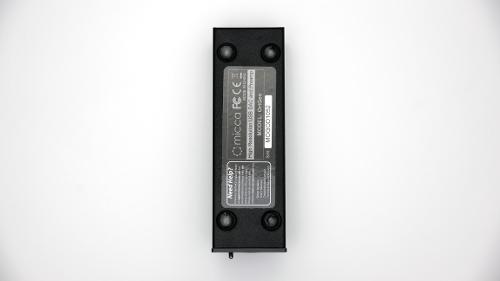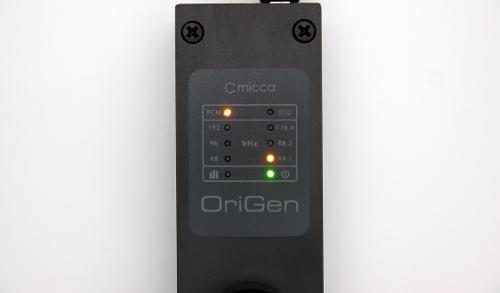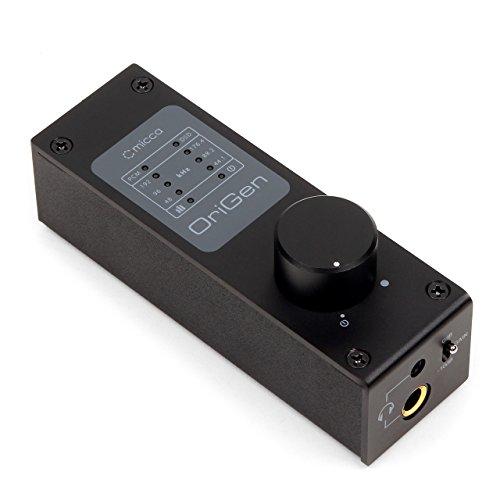--
The
Micca OriGen DAC/Amp:
http://www.miccatron.com/micca-origen-usb-audio-dac-and-preamp/
 - (All photos taken by me, except for the [color=rgba(0, 0, 0, 0.870588)]VIA USB Device Deck screen shots) -[/color]
- (All photos taken by me, except for the [color=rgba(0, 0, 0, 0.870588)]VIA USB Device Deck screen shots) -[/color]
[color=rgba(0, 0, 0, 0.870588)][/color]
[color=rgba(0, 0, 0, 0.870588)][/color]
[color=rgba(0, 0, 0, 0.870588)]**Disclaimer #1, I would like to thank Micca for providing a sample of the OriGen for my unbiased review**[/color]
[color=rgba(0, 0, 0, 0.870588)][/color]
[color=rgba(0, 0, 0, 0.870588)][/color]
[color=rgba(0, 0, 0, 0.870588)]**Disclaimer #2, Micca wanted it to be know that the OriGen was primarily designed as a pre-amplifier for use with Micca brand powered speakers, like the PB42X. The headphone amplifier is a secondary feature.**[/color][color=rgba(0, 0, 0, 0.870588)][/color]
[color=rgba(0, 0, 0, 0.870588)][/color]
[color=rgba(0, 0, 0, 0.870588)][/color]
[color=rgba(0, 0, 0, 0.870588)][/color]
[color=rgba(0, 0, 0, 0.870588)]*Important Specs*[/color][color=rgba(0, 0, 0, 0.870588)][/color]
[color=rgba(0, 0, 0, 0.870588)][/color]
[color=rgba(0, 0, 0, 0.870588)]- Playback that supports PCM Audio Up to 24-bit/192kHz and DSD64[/color][color=rgba(0, 0, 0, 0.870588)][/color]
[color=rgba(0, 0, 0, 0.870588)]- VIA VT1736 USB 2.0 High Speed 480Mbps Audio Controller[/color][color=rgba(0, 0, 0, 0.870588)][/color]
[color=rgba(0, 0, 0, 0.870588)]- Cirrus Logic CS4392 stereo D/A converter[/color][color=rgba(0, 0, 0, 0.870588)][/color]
[color=rgba(0, 0, 0, 0.870588)]- JRC NJM4556 Op Amps for Voltage[/color][color=rgba(0, 0, 0, 0.870588)][/color]
[color=rgba(0, 0, 0, 0.870588)]- Gain Levels of 5.6Vrms and 1.7Vrms Output[/color]

[color=rgba(0, 0, 0, 0.870588)][/color]
[color=rgba(0, 0, 0, 0.870588)][/color]
[color=rgba(0, 0, 0, 0.870588)]*Build*[/color][color=rgba(0, 0, 0, 0.870588)][/color]
[color=rgba(0, 0, 0, 0.870588)][/color]
[color=rgba(0, 0, 0, 0.870588)]With an anodized aluminum top plate, steel tub chassis and solid machined aluminum volume knob, all make up an extremely solid devise. There is also what I like to call a premium weight to it. When placing the OriGen on most surfaces, you will find that it says firmly in place.[/color][color=rgba(0, 0, 0, 0.870588)][/color]
[color=rgba(0, 0, 0, 0.870588)][/color]
[color=rgba(0, 0, 0, 0.870588)]More on the volume knob, I love the feel and feedback it provides for quick volume control, much better than a [+] [-] buttons.[/color][color=rgba(0, 0, 0, 0.870588)][/color]
[color=rgba(0, 0, 0, 0.870588)][/color]
[color=rgba(0, 0, 0, 0.870588)]A great feature is that Micca includes both a 3.5mm and 1/4” outputs for this build, which in return leads to less need of adapters and quicker headphone use. [/color]




[color=rgba(0, 0, 0, 0.870588)][/color]
[color=rgba(0, 0, 0, 0.870588)][/color]
[color=rgba(0, 0, 0, 0.870588)]*Contents*[/color][color=rgba(0, 0, 0, 0.870588)][/color]
[color=rgba(0, 0, 0, 0.870588)][/color]
[color=rgba(0, 0, 0, 0.870588)]- Micca OriGen [/color][color=rgba(0, 0, 0, 0.870588)][/color]
[color=rgba(0, 0, 0, 0.870588)]- Owners Manual [/color][color=rgba(0, 0, 0, 0.870588)][/color]
[color=rgba(0, 0, 0, 0.870588)]- MicroUSB to USB 2.0 Cord [/color][color=rgba(0, 0, 0, 0.870588)][/color]
[color=rgba(0, 0, 0, 0.870588)]- 3.5mm to RSA Out Cable [/color][color=rgba(0, 0, 0, 0.870588)][/color]
[color=rgba(0, 0, 0, 0.870588)]- Driver and Ultility CD[/color]

[color=rgba(0, 0, 0, 0.870588)][/color]
[color=rgba(0, 0, 0, 0.870588)][/color]
[color=rgba(0, 0, 0, 0.870588)]*Software*[/color][color=rgba(0, 0, 0, 0.870588)][/color]
[color=rgba(0, 0, 0, 0.870588)][/color]
[color=rgba(0, 0, 0, 0.870588)]Use of the VIA USB Device Deck program is pretty straight forward with simple control over; volume, channel balance and sample rates.[/color][color=rgba(0, 0, 0, 0.870588)][/color]
[color=rgba(0, 0, 0, 0.870588)][/color]
[color=rgba(0, 0, 0, 0.870588)]Below I have cut and pasted an example directly from the User Manual for example: [/color][color=rgba(0, 0, 0, 0.870588)][/color]
[color=rgba(0, 0, 0, 0.870588)][/color]
[color=rgba(0, 0, 0, 0.870588)]It should also should be noted that for foobar2000 or JRiver users to pay close attention to the User Manual for settings to get the optimal playback.[/color][color=rgba(0, 0, 0, 0.870588)][/color]
[color=rgba(0, 0, 0, 0.870588)][/color]
http://www.miccatron.com/wp-content/uploads/2015/09/Micca-OriGen-User-Manual.pdf
[color=rgba(0, 0, 0, 0.870588)][/color]
[color=rgba(0, 0, 0, 0.870588)]*Sound*[/color][color=rgba(0, 0, 0, 0.870588)][/color]
[color=rgba(0, 0, 0, 0.870588)][/color]
[color=rgba(0, 0, 0, 0.870588)]The sound signature can easily be described as neutralish, with a decent amount of clarity for this price range. Soundstage was neither large or small, but does lack a bit of instrument separation. Overall presentation is done on a budget, but is represented well enough. Though the OriGen does have a built-in headphone amp that supports 16-600 Ω, I found I needed to push them a bit harder on higher impedance units.[/color][color=rgba(0, 0, 0, 0.870588)][/color]
[color=rgba(0, 0, 0, 0.870588)][/color]
[color=rgba(0, 0, 0, 0.870588)]As promoted, the noise level is very low, even when using sensitive IEMs, the OriGen stayed extremely quite to the floor. Though I did notice that right before you get to zero that there is a slight channel imbalance that can be a little bothersome for those wanting to listen as a extremely low level. [/color]


[color=rgba(0, 0, 0, 0.870588)][/color]
[color=rgba(0, 0, 0, 0.870588)]*Comparison*[/color][color=rgba(0, 0, 0, 0.870588)][/color]
[color=rgba(0, 0, 0, 0.870588)][/color]
[color=rgba(0, 0, 0, 0.870588)]Micca OriGen vs. HiFimeDIY Sabre USB DAC 2:[/color]

[color=rgba(0, 0, 0, 0.870588)]Both:[/color][color=rgba(0, 0, 0, 0.870588)][/color]
[color=rgba(0, 0, 0, 0.870588)]- Cost Around $100[/color][color=rgba(0, 0, 0, 0.870588)][/color]
[color=rgba(0, 0, 0, 0.870588)]- Have Physical Volume Knobs[/color][color=rgba(0, 0, 0, 0.870588)][/color]
[color=rgba(0, 0, 0, 0.870588)]- Similar Neutral Sound Signatures[/color][color=rgba(0, 0, 0, 0.870588)][/color]
[color=rgba(0, 0, 0, 0.870588)]- Slight Imbalance at VERY Low Levels[/color][color=rgba(0, 0, 0, 0.870588)][/color]
[color=rgba(0, 0, 0, 0.870588)]- No Internal Batteries, External Power Needed[/color][color=rgba(0, 0, 0, 0.870588)][/color]
[color=rgba(0, 0, 0, 0.870588)][/color]
[color=rgba(0, 0, 0, 0.870588)]Differences: [/color][color=rgba(0, 0, 0, 0.870588)][/color]
[color=rgba(0, 0, 0, 0.870588)]- First thing you will notice about the two of these DAC/Amps is the build. The OriGen is much more solid and slender with its mostly metal materials. The HiFimeDIY Sabre USB DAC 2 is lightweight, wider and mostly plastic. Both within a size to be considered portable, but more of the sense if you are taking them somewhere you might be for a little while. Not as easy to carry around as say a USB DAC Thumb Drive.[/color][color=rgba(0, 0, 0, 0.870588)][/color]
[color=rgba(0, 0, 0, 0.870588)][/color]
[color=rgba(0, 0, 0, 0.870588)]- There is a different approach to drivers and software. The OriGen does need external drivers to be installed and at the same time installing software to better control your audio quality levels. USB DAC 2 takes a plug and play approach with no external drivers or software needed. [/color][color=rgba(0, 0, 0, 0.870588)][/color]
[color=rgba(0, 0, 0, 0.870588)][/color]
[color=rgba(0, 0, 0, 0.870588)][/color]
[color=rgba(0, 0, 0, 0.870588)][/color]
[color=rgba(0, 0, 0, 0.870588)]*Testing*[/color][color=rgba(0, 0, 0, 0.870588)][/color]
[color=rgba(0, 0, 0, 0.870588)][/color]
[color=rgba(0, 0, 0, 0.870588)]For my purposes, I used the Micca OriGen primarily with my VERY old Compaq Mini 110 NetBook running Windows 7 Starter and using foobar2000. The reason I used this computer was that it has an awful headphone out, being very noisy with not much power. The Micca OriGen came flying to the rescue with it multitude of playback options and low noise level. The OriGen did bring a lot of new life to my old NetBook, allowing me to have a decently portable setup that is great for travel at hotels, hospitals or other longer stay locations.[/color]

[color=rgba(0, 0, 0, 0.870588)][/color]
[color=rgba(0, 0, 0, 0.870588)][/color]
[color=rgba(0, 0, 0, 0.870588)]*Overall Thoughts*[/color][color=rgba(0, 0, 0, 0.870588)][/color]
[color=rgba(0, 0, 0, 0.870588)][/color]
[color=rgba(0, 0, 0, 0.870588)]While Micca did want me to include that the OriGen was primary made for their specific speakers, I found that they also do a wonderful job with headphones as well and that their disclaimer is not really warranted. For around $100 I find that this DAC/Amp has great value with its solid build and multiple playback options. The OriGen makes for a great little desktop or portable DAC/Amp combo that is easy on the wallet and good for the ears.[/color]

--
















